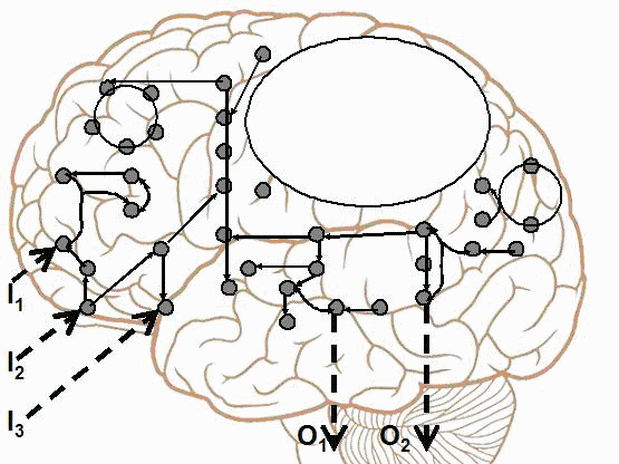Doodle at the Right Time to Boost Learning by 29%
 When faced with a long or boring lecture, phone call or other interaction doodling can improve your recall of key information by 29%. This was the finding of a randomized controlled study recently reported in Applied Cognitive Psychology.
When faced with a long or boring lecture, phone call or other interaction doodling can improve your recall of key information by 29%. This was the finding of a randomized controlled study recently reported in Applied Cognitive Psychology.
This is a strange finding because normally a second task would distract us and lower performance. Jackie Andrade, the University of Plymouth professor that did the research believes that the doodling may work because it keeps us from engaging in daydreaming and losing focus completely.
Doodling in the face of boredom then becomes a way to maintain not disrupt mental focus and should result in improved recall and learning.
Although simple, any technique for maintaining mental focus in a difficult task environment (boring, interruption prone, noisy, etc.) is key to improving cognitive performance and will be covered on the Next Brain Blog.
I am interested in hearing from readers that use doodling or other secondary techniques to improve mental focus.
Source: A doodle from Henri Poincaré’s Student Notebook
Categories: Memory and Learning, Mental Focus, Other Tags: doodling
Want to Dramatically Improve Self-Control?
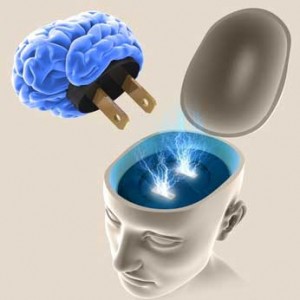 Then learn to manage your mental energy!
Then learn to manage your mental energy!
Science has made considerable inroads over the last few years defining, measuring and understanding the role mental energy plays in cognitive performance. Mental energy is defined as the combination of the ability to do mental work, the motivation for doing that work and your subjective feeling of fatigue. Key findings about mental energy include:
- We only have so much to use – it is a limited resource
- Exercising self-control or regulating our thoughts, emotions and behavioral responses burns considerable mental energy – much more than other cognitive processes such as learning and decision-making
- Running low on mental energy means loss of impulse control
- We can do specific things to replenish our supply of mental energy
Given the central role that mental energy (and its management) plays in cognitive performance it will be a frequent topic on the Next Brain blog.
Techniques for getting started in managing your mental energy include:
- Measuring your level of self-control and other cognitive tendencies that make extensive use of mental energy
- Journaling to understand how you wisely (or not) you use mental energy throughout the day
- Planning or budgeting your mental energy so you don’t set goals or engage in activities that result in sever depletion
- Developing habits that naturally restore your supply
Little things make a big difference when it comes to managing mental energy.
Categories: Executive Function, Lifestyle, Manage Emotions, Mental Focus, Training Tags: mental energy
Integrative Body-Mind Training Improves Brain Functions in Just Five Days!
 There is growing evidence that a fast-track approach to mediation may in fact produce results in as little as five days. This would be a breakthrough as using mindfulness or mediative techniques to improve your cognitive functioning normally takes months or years.
There is growing evidence that a fast-track approach to mediation may in fact produce results in as little as five days. This would be a breakthrough as using mindfulness or mediative techniques to improve your cognitive functioning normally takes months or years.
The technique is called integrative body-mind training (IBMT) and requires 20 minutes per day for five days. Subjects with no previous training in mediation techniques showed significant improvements in mental focus, mood and stress.
The process involves using a number of techniques together under the guidance of a coach. The seminal article on IBMT, Short-Term Medication Training Improves Attention and Self-Regulation, describes it this way:
“Training in this method is followed by 5 days of group practice, during which a coach answers questions and observes facial and body cues to identify those people who are struggling with the method. The trainees concentrate on achieving a balanced state of mind while being guided by the coach and the compact disc that teaches them to relax, adjust their breathing, and use mental imagery.”
A more detailed description of how this works over a five day period can be found in this Introduction to IBMT written by Dr. Yi-Yuan Tang a pioneer in the field.
I am interested to hear from readers that can recommend a coach, suggest resources or share experiences about IBMT. I’d like to try it and write additional posts for the next Brain Blog.
Source: Image of running man.
Categories: Ancient Ways, Executive Function, Memory and Learning, Mental Focus, Music and Audio, Training Tags: meditation, mindfulness
DASH Diet + Aerobic Exercise = 30% Improvement in Brain Function
 According to a news release by the American Heart Association, a diet developed to improve blood pressure combined with aerobic exercise over a four month period appears to improve the mental functioning of older overweight adults. Researchers claim mental functioning improved by 30%. Quoting the news release:
According to a news release by the American Heart Association, a diet developed to improve blood pressure combined with aerobic exercise over a four month period appears to improve the mental functioning of older overweight adults. Researchers claim mental functioning improved by 30%. Quoting the news release:
“Researchers assessed mental functioning with a battery of neuropsychological tests, including Executive Function-Memory-Learning and Psychomotor Speed. These tests measure cognitive skills involving manipulation of ideas and concepts and planning ahead. The tests were given before and after the four-month treatment program.”
The diet plan is called DASH (dietary approaches to stop hypertension) and involves:
- Eating more fruits, vegetables, whole grains, fish, poultry, nuts and foods rich in magnesium, potassium, and calcium
- Cutting back on red meats high total-fat foods and sweets
If you want to give it a try there are specific guidelines, recommendations and even food plans on The Dash Diet Plan Eating site.
The aerobic exercises were basic but supervised and took place for 30 minutes three times per week.
It is important to note that you have to do both the diet and exercise to get the improvement in mental functioning. Control groups that did one or the other, or nothing showed no improvement in mental functioning. These type of combination effects (doing two or more interventions to get a boost in cognitive performance) are common and will be frequently covered on the Next Brain Blog.
Source: Exercise and Diet Image
Categories: Cognitive Decline, Diet, Executive Function, Lifestyle, Memory and Learning, Older Adult, Other, Problem Solving Tags: exercise, fruit
Vitamins for Cognitive Performance
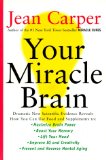 I am often asked if there are specific vitamins that are proven to enhance brain and cognitive function. The answer is yes but the level of improvement is not always clear. Vitamins that are generally called out for their brain boosting effects include:
I am often asked if there are specific vitamins that are proven to enhance brain and cognitive function. The answer is yes but the level of improvement is not always clear. Vitamins that are generally called out for their brain boosting effects include:
- B vitamins – memory and brain development
- Antioxidants or vitamins E, C and A (beta carotene) – overall functioning
- Multivitamins – overall functioning
Of course it is not just vitamins that help our brain function well but other supplements (e.g. minerals and fatty acids) and the foods we eat. Diet and supplements will be a frequent topic on the Next Brain Blog.
For a comprehensive overview of how supplements and diet impact brain function I suggest you read (or listen to) Jean Carper’s book, Your Miracle Brain: Dramatic New Scientific Evidence Reveals How You Can Use Food and Supplements To: Maximize Brain Power, Boost Your Memory, Lift Your Mood, Improve IQ and Creativity, Prevent and Reverse Mental Aging.
If you take supplements or have customized your diet to improve cognitive performance please leave a comment and share your results.
Categories: Books, Cognitive Decline, Diet, IQ and EQ, Memory and Learning, Mental Focus Tags: vitamins
Grow Smarter While Having Fun
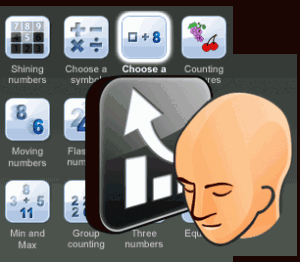 Brain games are all the rage. These are games you play for fun on your PC, game console or phone that also improve your cognitive functioning. There are dozens of traditional games and more recently scientifically-designed games that aim to improve memory, processing speed, visual perception, problem solving skill, mental focus and many other aspects of cognitive performance.
Brain games are all the rage. These are games you play for fun on your PC, game console or phone that also improve your cognitive functioning. There are dozens of traditional games and more recently scientifically-designed games that aim to improve memory, processing speed, visual perception, problem solving skill, mental focus and many other aspects of cognitive performance.
Do they work? Scientific American published an interesting article that took on that very question. What they found was many (50 or so) studies that show brain games can improve task performance but few if any that show that the effects translate into improvements in everyday cognitive activities. But they are optimistic:
One thing remains clear: there is no serious harm to brain training other than the effect on your wallet (and the risk of some egg on your face if your seven-year old can play them better). And evidence is accumulating that they not only improve the skills they are designed to help, but likely generalize to other cognitive abilities and have some long-lasting benefits.
Given this, games will be a frequent topic in the Next Brain Blog.
Another question to ask is are they fun? I’ve tried many of the scientifically designed brain games and find them boring after a couple of plays. Fortunately, some traditional games and puzzles also offer some cognitive performance boosts. For example, the popular math puzzle Sudoku is included in BrainAge, a brain training program pack with games that runs on a Nintendo DS handheld video game device.
The key is to find brain games that are truly fun for you and that have evidence supporting claims of cognitive improvement.
Here are some links to get your search started:
- Scientifically Designed Brain Games by Lumosity
- Top 50 Brain Teasers and Games by SharpBrains
- Top 10 Websites for Brain Training
Please post a comment on your favorite game that has brain boosting effects.
Source: Image of Resco Brain Games
Categories: Memory and Learning, Mental Focus, Perception, Problem Solving, Software Tags: brain training, games
Does Listening to Classical Music Increase IQ?
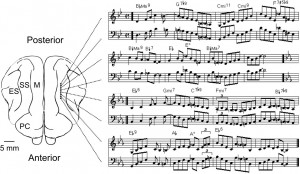 I get this question a lot. It goes back to the craze around the Mozart Effect or the idea you can get smart by listening to Mozart’s music. As far as I can tell there is no (or little) scientific evidence to support the idea. There is some evidence however that listening may temporarily (10-15 min) improve your spatial reasoning skills.
I get this question a lot. It goes back to the craze around the Mozart Effect or the idea you can get smart by listening to Mozart’s music. As far as I can tell there is no (or little) scientific evidence to support the idea. There is some evidence however that listening may temporarily (10-15 min) improve your spatial reasoning skills.
More relevant for readers of the next Brain Blog is the growing evidence that learning to play a musical instrument can improve many cognitive skills and perhaps raise IQ. Scans reveal musician’s brains look different and they tend to score higher on standardized tests for spatial-temporal tasks, verbal memory and even math. One study suggested a small increase in IQ of children taking music lessons.
As learning to play a musical instrument brings intrinsic satisfaction, it may be a particularly good option for building YourNextBrain! Interested to hear from reader with brain boosting experiences related to learning an instrument.
Source: Image of brain and sheet music
Categories: Child, IQ and EQ, Memory and Learning, Music and Audio, Training Tags: Mozart Effect
Is Your Next Brain in Fact Your Heart?
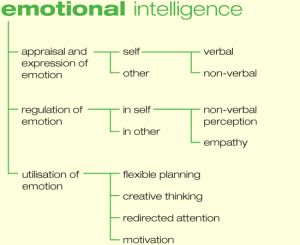 Daniel Goleman popularized the notion of Emotional Intelligence in 1995 in his best selling book by the same name. The idea is that a lot of what counts as smarts comes from our ability to perceive and manage emotions in ourselves and others. This is the foundation for self control and healthy relationships and leads to a successful life. The focus on emotional thinking versus rational or logical thinking as a key to intelligence was a huge paradigm shift that is still unfolding today.
Daniel Goleman popularized the notion of Emotional Intelligence in 1995 in his best selling book by the same name. The idea is that a lot of what counts as smarts comes from our ability to perceive and manage emotions in ourselves and others. This is the foundation for self control and healthy relationships and leads to a successful life. The focus on emotional thinking versus rational or logical thinking as a key to intelligence was a huge paradigm shift that is still unfolding today.
There is no doubt that understanding and manging emotions is a key for improving learning, decision-making, creativity, collaboration and other cognitive skills. Emotional intelligence will be a frequent topic on the Next Brain Blog. In an earlier post I provided links to quick and in-depth surveys that let you measure your emotional quotient (EQ) or level of emotional intelligence. In this post we will start to examine techniques for improving it.
For a quick introduction to how to develop your EQ check out the HELPGUIDE’s post on Five Key Skills for Building Emotional Intelligence. Although there are literally thousands of websites, books and other resources for learning about EQ I like this site. It demonstrates that emotional intelligence is rooted in common-sense life skills such as quickly reducing stress and managing your own feelings. No rocket science but the fact is that we often don’t take the time to develop specific skills to do these kinds of things and that impedes our cognitive performance.
Check the site out and please comment on the specific techniques you use to develop EQ.
Source: Emotional Intelligence Image
YourNextBrain! Hard at Work
In this Blog we will explore all manner of techniques for improving your mind and brain.
_________________________________________________________________________________________________________
Source: Brain image comes from a cover of NeuroQuantology: An interdisciplinary journal of neuroscience and quantum physics
Categories: Other Tags:
Mental Practice Makes Perfect
Playing things out in your mind before you actually do them is a great way to improve performance in many different types of tasks. Mental practice or rehearsing is a technique that is taught to athletes, managers, high-performance sales people and many other professionals. How to improve you skill in mental practice will be a frequent topic on the Next Brain Blog.
For a quick introduction check out Head Games: An Introduction to Mental Rehearsal by Dr. Scott Williams a Professor of Management and Director of the Center for Innovation at Wright State University.
He offers this nine-step procedure for doing mental practice (and I quote):
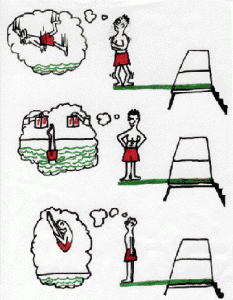 “Find a time and place where you won’t be interrupted.
“Find a time and place where you won’t be interrupted.- Recline or lie down, and close your eyes.
- Relax, concentrate, and focus. Take deep breaths and exhale slowly. As you exhale, imagine that stress is leaving your body. Start at your feet … feel all the stress leave your feet … then your legs … then your chest … all the way to the top of your head … feel all the stress leave your body. Free your mind of distractions and allow your mind to focus on the relaxation process.
- Once relaxed, focus on the specific challenging task.
- Mentally tell yourself that you are confident and that you have the ability to perform this task successfully. Repeatedly tell yourself, with confidence, that you will be successful.
- Imagine what you will see just before you begin the task. Visualize yourself as an active participant, not as a passive observer. For example, to mentally rehearse putting a golf ball, imagine that you are standing on the green rather than watching yourself from the gallery.
- Remaining relaxed and focused, mentally rehearse successful performance of this task. Imagine going through the process and seeing successful results.
- Repeat step 7 several times.
- Finally, open your eyes and smile. You have successfully performed in your mind, which is great preparation for actual performance. You should now be confident that you will perform successfully in the real situation. Remember to praise yourself for being successful. Self-reinforcement is another a key to self-motivation.”
Try this out on a task or performance you have coming up in the next couple of days. Does it work? Leave a comment and share your experience and results.
Source: Image of Diver
Categories: Memory and Learning, Training Tags: brain training, sports

